MORE GLOBAL Keio Students’ International Experiences (3)
Keio Students’ International Experiences on Campus
International experience can be gained not only abroad but also in Japan. We spoke to Keio students who were involved in the organization and operation of an international symposium and we will also introduce how Keio University is developing its curricula to add an international dimension to its classes.
Organizing the Largest Student Conference in the Asia-Pacific Region
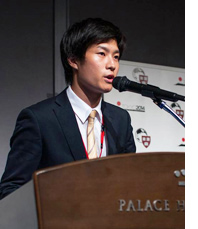
Fourth-year student at the Department of Law, Faculty of Law
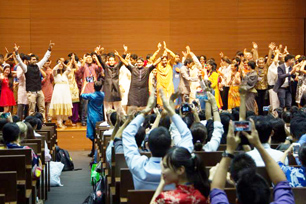
I was involved in organizing the Harvard Project for Asian and International Relations (HPAIR), which was held last year from August 22 to August 26. HPAIR is an organization at Harvard University that holds international conferences to which as many as 500 students from prestigious universities in mainly the Asia-Pacific region and specialists from a wide range of fields gather together to discuss various issues relevant to the region. For last year’s conference in Tokyo, with the cooperation of Keio University, we were able to use Mita Campus as one of the venues and invite distinguished figures from various sectors such as Hiroshi Mikitani, the CEO of Rakuten, to speak at the event.
I mainly took on tasks related to the conference bidding, and part of my job in preparing for the event was to make appeals to Keio University for its full support and conduct meetings—as much as two to three hours a week—with students from Harvard University. When I first got involved, I felt extremely nervous and worried whether young Japanese students can contend on par with talented students around the world, but throughout all our meetings I tried to keep focus on how we can make this symposium meaningful for Japan and for Tokyo. We also managed to expand our operation team, which started from just a handful of people, to around 30 people, and we also worked hard to devise ways of avoiding any deficit in the running of the conference.
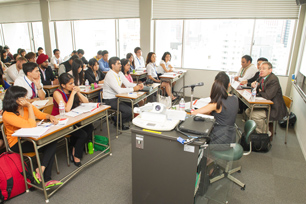
My main hope was to organize a conference that allowed the world to learn more about today’s Japan as well as Keio University, and by bringing overseas students to Japan, I wanted to create an opportunity for young people of my generation to come in contact with the world, to be stimulated, and to expand their minds. As a result, a lot of Japanese students came up to me after the event and told me that it was an experience they rarely encounter living in Japan, and being able to reconfirm where they stand in the world inspired them to study and work even harder. I would like to once again thank everyone at Keio University and the Mentor Mita-kai for their support, as well as everyone who helped us during the two-year preparation in contributing to the success of the event.
The Global Passport Program at the Faculty of Business and Commerce: Learning about Theory and Social Reality Through Specialized Classes Conducted in English
Developing the Curriculum and Class Environment to Give Students the Study Abroad Experience at Keio
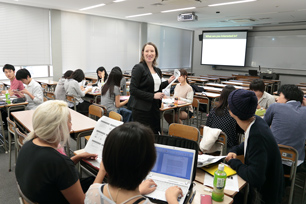
Classes for the Global Passport Program (GPP) at the Faculty of Business and Commerce are conducted entirely in English. The class sizes are small with only around 20 students in each class, most of which are attended by international exchange students, and many of the faculty members are from overseas. Students are offered a learning environment similar to what they can access at overseas universities while being in Japan.
The GPP curriculum is composed of three main pillars:
(1) Coursework
Students are able to cross-register for courses in the Graduate School of Business and Commerce, centered on introductory level courses on management, accounting, and commerce.
(2) Workshops
Students form small groups of four including one international student, and are required to come up with a practical research topic that the team can explore together. Since international students become a part of each team, the classes and meetings that students plan outside of class hours are naturally conducted entirely in English. Every week there is allotted time for presentations, and at the end of the semester each group presents their research results.
(3) Activities
Lectures with invited executives from leading-edge corporations, debates, and visits to corporations are included in the various on- and off-campus activities. The Overseas Field Trip in March is also part of these activities.
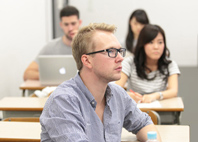
The GPP is open to third- and fourth-year students of all faculties, not just the Faculty of Business and Commerce. Students are selected from applications based on their GPA and TOEIC scores. Upon completing two semesters and earning the required credits, students will be presented with a certificate of completion of the GPP program.
The objective of the GPP at the Faculty of Business and Commerce is to develop human resources who can take on a leadership role in this globalizing world.
Cultivating English Communication Skills Through Workshops with International Students
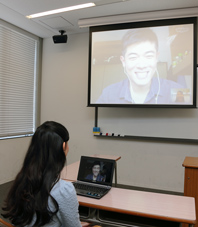


We asked two former participants of the GPP, Marika Takizawa (fourth-year at the Faculty of Business and Commerce) and Zehao Xiong (former exchange student from the National University of Singapore who participated in the interview through Skype), about the appeal and merits of the program.
Why did you apply for the GPP?
(Takizawa)
Since last year, I have been taking courses at the International Center to learn about business in English and experience cross-cultural interaction but I wanted to further my skills and so I decided to participate in the GPP.
(Xiong)
I wanted to make my valuable study abroad period in Japan as productive and fruitful as possible. Being able to take courses in economics, finance, and human resource systems at the world-class level and interact closely with Japanese students was very appealing to me.
What did you like about the classes?
(Takizawa)
I really enjoyed the workshop. There were four of us including one international student from Germany. From deciding on our topic of how to improve human resource systems in Japanese corporations, compiling questionnaires, interviewing students, to giving presentations, as well as all the meetings in and outside of class, were conducted in English. Through the discussions, I developed the ability to logically convey my opinions in English.
(Xiong)
I also learned and gained many things from the workshop. We came up with our topic, collected and brought in various data and materials, conducted numerous meetings and presented in class every week. It was a very productive workshop in a free and open atmosphere, and we all shared our opinions, asked lots of questions, and gave each other advice.
(Takizawa)
Because it was a small class, we enjoyed spending time with each other outside class. I have never lived or studied abroad, so I also gained a lot from interacting with international students from different countries and experiencing firsthand the diversity of opinions and ways of thinking.
(Xiong)
Yes, I also think interacting outside class is really important. Japanese students who seemed at first a little daunted talking in English were able to relax more after going to dinners and parties together, and they gradually started speaking their minds a lot more in class. I made a lot of Japanese friends through the program.
